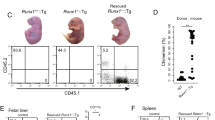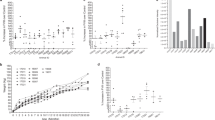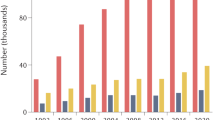Abstract
THE fœtal part of the placenta may be looked on as a homograft. With the exception of intra-inbred matings, it should possess a different genetic constitution from the mother's tissues, and its syncytium is in close contact with maternal blood in the intervillous spaces and to some extent with the endometrium and even the myometrium.
This is a preview of subscription content, access via your institution
Access options
Subscribe to this journal
Receive 51 print issues and online access
$199.00 per year
only $3.90 per issue
Buy this article
- Purchase on Springer Link
- Instant access to full article PDF
Prices may be subject to local taxes which are calculated during checkout
Similar content being viewed by others
References
Medawar, P. B., Symp. Soc. Exp. Biol., 7, 320 (1953). Park, W. W., Modern Trends in Pathology, 180 (London, 1959). Breyere, E. J., and Barrett, M. K., J. Nat. Cancer Inst., 24, 699 (1960). Galton, M., Lancet, 495 (1960). Gordon, I., ibid., 1074 (1960). Prehn, R. T., J. Nat. Cancer Inst., 25, 883 (1960).
Author information
Authors and Affiliations
Rights and permissions
About this article
Cite this article
HAŠKOVÁ, V. Transplantation Non-antigenicity of the Fœtal Placenta. Nature 193, 278–279 (1962). https://doi.org/10.1038/193278b0
Issue Date:
DOI: https://doi.org/10.1038/193278b0
This article is cited by
-
Immunchemische Untersuchungen zum Problem der ?pregnancy zone?
Archiv f�r Gyn�kologie (1969)
Comments
By submitting a comment you agree to abide by our Terms and Community Guidelines. If you find something abusive or that does not comply with our terms or guidelines please flag it as inappropriate.



